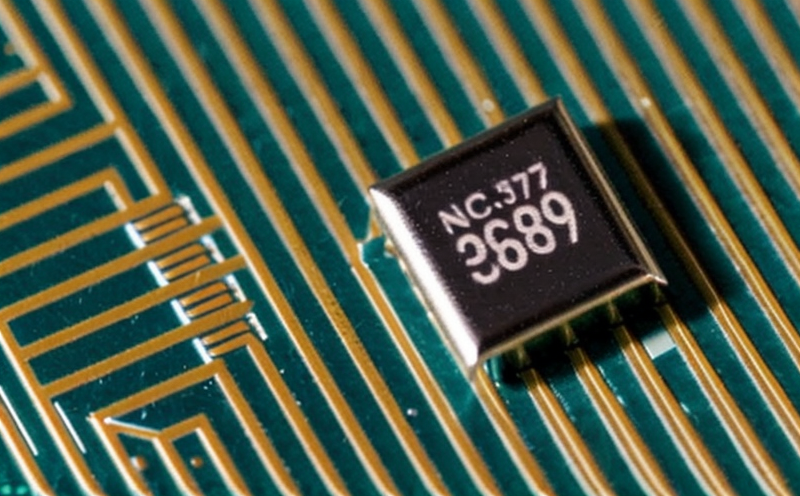IEC 60749-24 Mechanical Integrity Lifetime Testing
The IEC 60749-24 standard is designed to evaluate the mechanical integrity of microchips and other semiconductor devices over their entire lifetime. This test ensures that components can withstand the physical stresses encountered during manufacturing, installation, and operational phases without compromising performance or reliability.
Mechanical integrity testing is crucial for ensuring the robustness of microchip designs against environmental factors such as temperature cycling, mechanical shock, vibration, and static forces. These tests are essential in validating that semiconductor devices meet stringent quality and safety standards set by international organizations like IEC (International Electrotechnical Commission).
During this testing process, the specimen is subjected to various mechanical stimuli to simulate real-world conditions it might encounter during its lifecycle. The test parameters include but are not limited to:
- Temperature cycling from -40°C to +150°C
- Vibration at frequencies up to 2,000 Hz
- Mechanical shock levels of up to 50 g
- Static force application ranging from minimal operational load to maximum rated capacity
The test aims to identify potential weak points in the microchip’s structure early on, allowing manufacturers and designers to address these issues before mass production begins. By conducting such rigorous mechanical integrity tests, companies can enhance product durability, reduce warranty costs, and improve overall customer satisfaction.
Understanding the importance of mechanical integrity testing helps stakeholders appreciate why this particular standard is vital for ensuring safe and reliable semiconductor devices across various industries including automotive, aerospace, telecommunications, medical devices, and consumer electronics. This form of testing not only protects end-users from potential hazards but also contributes significantly to reducing environmental waste by extending product lifecycles.
For quality managers looking into implementing robust quality assurance practices within their organizations, mechanical integrity tests provide valuable insights into the longevity and reliability of microchip products. Compliance officers will find this testing method indispensable for ensuring adherence to global regulatory requirements while R&D engineers benefit from identifying areas requiring improvement early in development cycles.
Moreover, mechanical integrity lifetime testing is particularly beneficial for procurement teams seeking suppliers who meet stringent quality standards before finalizing contracts. By choosing partners that adhere strictly to protocols outlined by IEC 60749-24, organizations can ensure they receive high-quality components capable of withstanding harsh operating environments.
International Acceptance and Recognition
The IEC 60749-24 standard has gained widespread acceptance among manufacturers, quality assurance professionals, and regulatory bodies worldwide. Its rigorous testing procedures have earned it a reputation for accuracy and reliability in assessing mechanical integrity.
Companies operating internationally rely on this standard to ensure their products meet the expectations of diverse markets while complying with local regulations. For instance, automotive companies often use these tests when developing advanced driver assistance systems (ADAS) or electric vehicle powertrains where durability is paramount.
R&D engineers also value IEC 60749-24 because it provides a structured approach to evaluating new designs before they reach the production floor. This ensures that innovations are thoroughly tested and validated against real-world conditions, reducing the risk of failures once deployed in vehicles or other applications.
Moreover, compliance officers find this standard invaluable when navigating complex regulatory landscapes across different countries. It simplifies the process by providing a universally accepted framework for mechanical integrity testing.
Environmental and Sustainability Contributions
Mechanical integrity lifetime testing plays an important role in promoting environmental sustainability through enhanced product durability. By ensuring that microchips can withstand harsh operating environments, this type of testing contributes to reduced waste generation.
Products that have been properly tested are less likely to fail prematurely due to mechanical stress, leading to longer service lives and fewer replacements needed over time. This reduces the demand for raw materials used in manufacturing new products, thereby conserving natural resources.
Additionally, by improving product reliability, mechanical integrity tests help minimize energy consumption associated with rework processes or early disposal of defective units. This contributes positively to overall environmental impact reduction efforts within semiconductor industries.
Why Choose This Test
- Mechanical integrity tests provide critical data on how well a product will perform under various stress conditions, helping to predict its lifespan accurately.
- This testing method ensures compliance with international standards like IEC 60749-24, which is essential for global market access and regulatory approval.
- By identifying weaknesses early in the development process, manufacturers can make necessary adjustments to improve product quality before production begins.
- The test results contribute significantly towards enhancing customer satisfaction by delivering reliable microchips that meet expected performance levels throughout their operational lifecycle.





